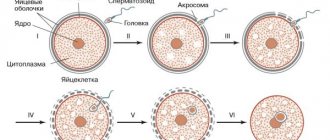What is included in birth control pills
The beneficial properties of birth control pills are due to their composition. COCs include 2 components:
- Estrogenic. Thanks to synthetic hormones, the normal development of the endometrium is imitated. This eliminates the possibility of uterine bleeding.
- Progestogenic. The useful component prevents pregnancy, which is achieved as a result of necessary changes in the functioning of the reproductive organs.
Most birth control pills contain ethinyl estradiol (an active estrogen). Progestogens are derivatives of 19-nortestosterone:
- Levonorgestrel;
- Norethisterone;
- Norgestrel.
Modern progestogens include:
- Drospirenone;
- Gestodene;
- Desostrel;
- Dienogest.
Important!
Modern COCs provide maximum benefit, since the androgenic effect is not pronounced. Birth control pills do not cause harm in the form of a significant increase in body weight and influence on metabolic processes in the body. Gynecologists recommend taking pills exclusively with a progestogen component to patients after childbirth. These beneficial drugs are called mini-pills. This is due to the properties and composition of COCs. Estrogens have the property of suppressing the production of breast milk.
Progestin-only birth control pills (Charosetta) are prescribed to women to limit the intake of estrogen. Gestagens are indicated for diabetes, hypertension, and obesity. Otherwise, COCs may be harmful.
If the estrogen concentration is less than 35 mcg, such COCs are considered low-dose. Microdosed contraceptives contain 20-30 mcg of estrogen. High-dose birth control pills contain 50 mcg ethinyl estradiol.
Attention! High-dose COCs are often prescribed for therapeutic purposes.
Depending on the composition, birth control pills come in 3 types:
- Monophasic. The content of useful components is the same in all pills. They come in low-dose (Femoden, Regulon and Marvelon) and micro-dose (Logest, Novinet and Mercilon).
- Two-phase. Includes a constant amount of estrogen. The concentration of progestogens increases during phase 2 of the cycle. The total dose of estrogen is significantly higher compared to monophasic COCs. The dosage of progestogens is reduced. Among the new generation of drugs that also provide benefits as a therapeutic agent are Trialen, Tri-Mercy and Trisilest.
- Three-phase. The hormone ratio is changed to mimic the natural cycle.
Some birth control pills have beneficial antiandrogenic properties because they include a progestogen. Among COCs with antiandrogenic properties, Janine and Diane-35 are distinguished. Novinet, Tri-Mercy and Regulon have a pronounced progesterone-like effect.
Important! COCs containing desogestrel are beneficial in the treatment of hyperandrogenism in adolescents.
The fourth generation progestogenic substance is drospirenone. The component is characterized by useful properties:
- antiestrogenic;
- antigonadotropic;
- antiandrogenic.
Drospirenone does not harm the body in the form of pronounced side effects and is recommended for women with blood pressure surges. The benefit of birth control pills is to relieve PMS symptoms.
The following combinations of progestogens and estrogens are called:
- estrogen + norgestrel (Cycloproginova);
- levonorgestrel + estrogen (Rigevidon, Microgynon);
- estrogen + desogestrel (Marvelon, Novinet);
- gestodene + estrogen (Femoden, Gestarella);
- estrogen + norgestimate (Dimia, Yarina);
- estrogen + nomegatrol (Zoeli);
- ethinyl estradiol + dienogest (Janine).
Combinations of estrogens and progestogens:
- estrogen + levonorgestrel (Tri-regol);
- estrogen + desogesrel (Tri-Mercy).
Progestogens are represented by the following synthetic hormones:
- levonorgestrel (Excapel);
- linestrenol (Excluton);
- desogestrel (Charozette).
Important! Levonorgestrel is used for emergency contraception.
Mechanism of action
Hormonal oral contraceptives are divided into three groups:
- combined oral contraceptives
- drugs containing progesterone
- emergency contraception.
COOK
Combined oral contraceptives contain synthetic hormones estrogen and progestin. Depending on the ratio in which they are contained in one tablet, this group of COCs is divided into:
- monophasic
- two-phase
- three-phase.
The first category has the same composition throughout the entire course of admission. The dose of the hormones estrogen and progestin does not change depending on the day of the cycle. The second category is characterized by the fact that the package contains tablets of two colors, where in one the estrogen exceeds the progestin, and in the other - vice versa.
The principle of operation of this type of birth control pill is to imitate a two-phase menstrual cycle. The last category contains tablets in three different colors. For three-phase birth control pills to work correctly, they must be taken at a certain phase of the monthly cycle.
Combined oral contraceptives are most often used. A woman who has chosen this method of birth control should not worry about whether ovulation occurs while taking birth control pills. This drug suppresses folliculogenesis and inhibits ovulation, preventing the maturation and release of the egg. Follicle-stimulating hormone stimulates oocyte maturation. Taking the pill regulates the level of estrogen hormone so that it does not affect the development of the embryonic egg.
Also this tool:
- Causes atrophy of the uterine mucosa (may affect the structure of the endometrium).
- Blocks sperm access to the uterine cavity (thickens cervical mucus).
- reduces the risk of ovarian cancer in female smokers by 66%.
With progesterone
Oral contraceptives that contain only progesterone are called “mini-pills.” One pack contains 28 pills, which are taken every 24 hours (even on the days of the menstrual cycle) without breaks. If a woman misses one dose, it should be resumed immediately. It is recommended to take the tablets at a certain time.
Mini-pill:
- They influence changes in the mucous membrane of the uterine cavity, minimizing the possibility of implantation of a fertilized egg.
- They increase the viscosity of the mucus produced by the cervix, which makes it difficult for sperm to penetrate through it.
- They inhibit the production of luteinizing hormone (necessary for the functioning of the reproductive system), which inhibits ovulation (in 20-70% of cycles).
Emergency contraception
Emergency contraception is more aggressive than other drugs. They are used in cases of unprotected sexual intercourse, after rape, etc. The composition of drugs of this kind includes a large amount of the synthetic hormone progestin. To prevent unwanted fertilization, the OC must be taken no later than three days later.
What are the benefits of birth control pills?
The benefits of hormonal contraceptives for the female body are undeniable. COCs are used not only for contraceptive purposes, but also for therapeutic purposes in various pathological conditions.
The health benefits of birth control pills include:
- cycle stabilization;
- reducing the amount of discharge, which helps eliminate anemia;
- reducing the intensity of pain during menstruation;
- increasing the protective qualities and properties of cervical mucus and reducing the risk of infectious processes;
- prevention of mastopathy;
- suppression of androgen synthesis, causing the elimination of hirsutism and acne;
- increasing bone density and a beneficial effect on the process of calcium absorption, which is the prevention of osteoporosis.
Hormonal pills are beneficial for women. According to research results, there is a reduction in the risk of developing cancer of the reproductive organs in women taking COCs for a long time. As a rule, we are talking about endometrial, breast and ovarian cancer.
Attention! The rapid rejuvenation of oncological pathologies of the reproductive organs is often associated with low birth rates and a large number of menstruation, which was not originally intended by nature.
The beneficial effect of birth control pills on the body is manifested in the possibility of treating many hormone-dependent diseases. Oral contraceptives are used to treat endometriosis, PCOS, hirsutism, and some forms of infertility.
Important female hormones
A very large number of hormones “work” in the female body. Their coordinated work allows a woman to feel like a woman.
Estrogens
These are “female” hormones that stimulate the growth and function of the female genital organs and the growth of the mammary glands. In addition, they are responsible for the appearance of female secondary sexual characteristics, i.e., breast enlargement, fat deposition and the formation of female-type muscles. In addition, these hormones are responsible for the cyclicity of menstruation. They are produced by the ovaries in women, the testes in men, and the adrenal cortex in both sexes. These hormones affect bone growth and water-salt balance. After menopause, women have less estrogen. This can lead to hot flashes, sleep disturbances and atrophy of the genitourinary system. Also, a lack of estrogen can be a cause of osteoporosis that develops in postmenopause.
Androgens
Produced by the ovaries in women, the testes in men, and the adrenal cortex in both sexes. These hormones can be called “male” hormones. In certain concentrations, they cause women to develop male secondary sexual characteristics (deepening of the voice, growth of facial hair, baldness, growth of muscle mass “in the wrong places”). Androgens increase libido in both sexes.
A large amount of androgens in the female body can lead to partial atrophy of the mammary glands, uterus and ovaries and infertility. During pregnancy, under the influence of excess amounts of these substances, a miscarriage may occur. Androgens can reduce the secretion of vaginal lubrication, making sexual intercourse painful for the woman.
Progesterone
Progesterone is called the “pregnancy” hormone. It is produced by the corpus luteum of the ovaries, and during pregnancy also by the placenta. Progesterone helps maintain pregnancy, stimulates the development of the mammary glands and “prepares” the uterus for bearing a fetus. During pregnancy, its level increases 15 times. This hormone helps us get the most nutrients from what we eat and increases our appetite. During pregnancy, these are very useful qualities, but if its formation increases at other times, this contributes to the appearance of extra pounds.
Luteinizing hormone
Produced by the pituitary gland. It regulates the secretion of estrogen by the ovaries in women, and is also responsible for ovulation and the development of the corpus luteum.
Follicle-stimulating hubbub
Synthesized by the pituitary gland. Stimulates the growth and maturation of ovarian follicles, estrogen secretion and ovulation. Gonadotropic hormones (FSH - follicle-stimulating hormone, LH - luteinizing hormone and prolactin), produced in the adenohypophysis, determine the sequence of maturation of follicles in the ovary, ovulation (the release of the egg), the development and functioning of the corpus luteum."
Prolactin
This hormone is also produced by the pituitary gland. In addition, the mammary gland, placenta, central nervous system and immune system are involved in its secretion. Prolactin stimulates the growth and development of the mammary glands and is involved in the formation of maternal instinct. It is necessary for lactation, increases milk secretion and converts colostrum into milk.
This hormone prevents the occurrence of a new pregnancy while breastfeeding the baby. It is also involved in providing orgasm and has an analgesic effect. Prolactin is called a stress hormone. Its production increases under stressful conditions, anxiety, depression, severe pain, psychosis, and the influence of unfavorable external factors.
All these hormones are very important for the proper functioning of a woman’s body. They allow the female body to function normally.
Harm of birth control pills and side effects
Hormonal pills have both benefits and harm. This is due to their basic properties.
Side effects may occur when taking oral contraceptives. In most cases, undesirable effects are mild. Often, adverse reactions do not cause harm to the body and occur in the first months of use.
There are two main groups of adverse reactions:
- Clinical. This item includes general changes and disorders that cause deviations in the menstrual cycle. Common effects include dizziness, weight gain, headache, depression, and rash. If hair loss occurs, it is necessary to replace the drug with another one. Against the background of cycle disorders, spotting of an acyclic nature may be observed. Normally, such discharge disappears within 3 months. Otherwise, the drug is discontinued.
- Hormone dependent. The effects are determined by the specific type of synthetic hormones and their properties.
In most cases, adverse reactions do not cause serious harm to the body. They are usually temporary, go away on their own and do not require specialist consultation or drug discontinuation.
Features of hormonal drugs
Such a broad concept as “hormonal drugs” includes various medications:
- Contraceptives.
- Treatments (drugs that cure diseases, for example, somatotropin in childhood treats dwarfism caused by its deficiency).
- Regulating (various tablets for normalizing the menstrual cycle or hormonal levels).
- Supportive (insulin for diabetics).
They all have different effects on a woman’s body.
Contraceptives
Without contraceptives, it is difficult to avoid unwanted pregnancy, and constantly using condoms or other mechanical methods of protection can be inconvenient. Therefore, many drugs have been developed for the fairer sex, the use of which does not cause pregnancy.
Most often, the effect of contraceptives is that they prevent the egg from attaching to the walls of the uterus, so the development of the fetus becomes impossible. The use of contraceptives in the form of pills is popular today, but along with the positive qualities, there are also negative consequences for the woman’s body:
- menstrual irregularities (due to incorrect selection of the drug);
- swelling and weight gain (due to the body not taking medications);
- hair loss, brittle nails and dry skin (due to improper selection);
- lethargy, poor health, decreased libido.
But all these qualities in 90% of cases manifest themselves due to incorrect or independent selection of contraceptives. Only a gynecologist can select such serious medications, because for this it is necessary to analyze the woman’s hormonal data. Under no circumstances prescribe oral contraceptives on your own, because just because some contraceptives didn’t make one girl feel bad, this doesn’t mean that they will suit others.
But not everyone can use this method of protection.
There are several contraindications for the use of hormonal contraceptives:
- presence of problems with the background;
- taking antibiotics;
- pregnancy;
- problems with the cardiovascular system;
- age less than 17 years;
- excess weight and allergic reactions.
During the period of such protection, chronic diseases may worsen. Discuss all the details with your doctor or gynecologist before you start taking contraceptives.
Side effects
Instructions for hormonal contraceptives sometimes list mental disorders as side effects. These are usually depression and anxiety disorders. Fear attacks or panic attacks are not always indicated separately because they are often reduced simply to anxiety disorders. Although they deserve special attention and can greatly ruin the life of a woman who uses contraceptives. According to research conducted by the Royal Society of General Practitioners, women taking hormonal contraception have an increased risk of mental illness, neurotic depression (10-40%), the development of psychosis, and suicide. Aggression increases, and changes in mood and behavior are noted. It is possible that this factor has a significant impact on the life of the family and society.
If we consider that the mood of women is influenced even by the normally observed fluctuations in the levels of endogenous hormones during the menstrual cycle (for example, according to data from France and England, 85% of crimes committed by women occur in their premenstrual period), it becomes clear why when taking GC Aggression and depression increase by 10-40%.
Under the influence of contraception, the level of the hormone testosterone, which is responsible for sexuality, is significantly reduced. Women taking hormonal contraceptives often complain of a lack of desire, lack of sexual desire, and difficulty achieving orgasm. It is known that with long-term use of hormonal contraceptives, irreversible changes in the area of sexuality and libido can occur. Due to the blocking of testosterone, very young girls using contraceptives experience sexual coldness, often anorgasmia.
When taking hormonal contraceptives, special attention should be paid to the following recommendations:
- pills intended to protect against unwanted pregnancy do not protect the female body from sexually transmitted diseases;
- women over 35 years of age should stop smoking when taking combined contraceptive pills, as in this case the risk of vascular blockage increases significantly;
- During breastfeeding, it is undesirable to use tablets of a combined composition, since the estrogen in their composition affects the quality and composition of milk. In this case, tablets containing only the corpus luteum hormone are prescribed;
- if nausea, dizziness, or stomach upset occur, you should consult a specialist;
- if you are prescribed medications, you must inform your doctor that you are taking hormonal contraceptives;
- if there is a miss in taking pills, then there is a need to use additional contraceptives, for example, condoms;
- For women with severe forms of endocrine diseases, for example, diabetes mellitus, as well as those with pathology of the heart and blood vessels, neoplasms, taking oral contraceptives is undesirable.
Treating
This group treats the body from diseases and disorders. Such hormonal preparations can be in the form of tablets or external use. The former are used to treat serious diseases caused by hormonal imbalances. The latter affect more locally, at the places of use.
Often, girls synthesize few hormones responsible for the synthesis of new cells, so cracks or bleeding wounds appear on the skin, especially in winter, and do not heal. To treat them, a dermatologist may prescribe a cream, ointment, or lotion with certain hormones.
Often, ointments contain corticosteroids, which, when applied to the skin, are absorbed into the blood within a few hours and begin to act. How does this group affect the body? This issue should be taken seriously, because the medications that are used most require attention when prescribing, determining the dosage and duration of the course, because the wrong step will cause complications of existing disorders.
Regulatory
Due to the crazy pace of life, daily poor nutrition, bad habits, sedentary lifestyle and new-fangled diets, women often suffer from menstrual irregularities. This negatively affects the development of the reproductive system, the general condition of the body, increases the risk of developing breast cancer, and can also cause infertility. But there is a solution to this problem, because most often the cycle goes wrong due to changes in hormonal levels.
Therefore, a detailed blood test is taken for these substances. Such procedures are not cheap, because working with hormones is very difficult, but remember: treating the consequences of disorders will cost much more, so take care of your body in a timely manner.
After identifying specific hormones that are deficient or in excess, a course of medications is prescribed to regulate their levels. These could be pills or injections. Often, gynecologists prescribe oral contraceptives to normalize the menstrual cycle. Don't be afraid, they are not trying to deceive or make things worse. Depending on the test results, some hormonal remedies actually improve menstruation without causing negative consequences. The influence of regulatory agents depends on the correctness of their selection and dosage, because the body requires active substances in the smallest doses, so it is very easy to cross the line of the norm. For example, if you overdo it with progesterone injections when there is a lack of it, you may experience swelling, nausea, hair loss and pain in the mammary glands.
Supporters
These pills or injections keep the body normal if diseases or disorders can no longer be cured. This may be due to chronic diseases, constant malfunctions, poor functioning of endocrine organs, and others. For example, without insulin injections, a diabetic can die within a few days, even if he does not eat sweets.
Thyroxine tablets can stop the development of myxedema in people with thyroid dysfunction.
These drugs can often cause harm:
- loading the gastrointestinal tract;
- irritating the mucous membranes of the stomach or intestines;
- causing hair loss or other unpleasant symptoms.
But it is impossible to refuse them, because these are the drugs that keep the patient alive.
Hormonal drugs have a profound effect on a woman’s body, especially if they are oral contraceptives or regulating agents. Therefore, remember that only a specialist can prescribe them after detailed tests. Tablets, injections, ointments and other medications with hormones often disrupt the functioning of the digestive system, excretory system, and can cause weakness, so consult your doctor if such symptoms occur.
Consequences of taking birth control pills
Consequences from the use of COCs are rare and are usually associated with improper selection of medications. Due to atrophy of the inner layer of the uterus, amenorrhea is possible. This phenomenon either goes away on its own or is corrected with medication.
Severe consequences that harm the body may include:
- thrombosis;
- thromboembolism.
Important! The risk of serious consequences is considered low and increases with obesity, hypertension and smoking.
How to take it so as not to harm yourself?
In no case.
Only a doctor can prescribe pills after consultation. What if you have contraindications that your friend doesn’t have, and you’re at risk? What if a friend’s doctor prescribed her an old-generation drug, or did the friend even buy the medicine on the advice of a neighbor?
It will be you, not your friend, who will risk your health. Do not do it this way.
The instructions for contraceptive drugs strictly define contraindications for their use. It is prohibited to do this in the following conditions:
- previous thrombosis or a tendency to it;
- severe liver dysfunction;
- tumors of the genital organs, stomach or liver;
- during breastfeeding;
- with bleeding from the vagina;
- with impaired pancreatic function.
Women after a cesarean section can take birth control pills no earlier than 1 month after the operation.
Contraindications to taking birth control pills
To minimize the harm that oral contraceptives can cause, before using them it is necessary to exclude possible contraindications to taking:
- thrombosis of arterial and venous nature;
- history of ischemic attack;
- IHD;
- diabetes mellitus with emerging vascular disorders;
- migraine;
- severe pathologies of the pancreas and liver;
- tumors of the mammary glands and genital organs, as well as the liver;
- uterine bleeding of unknown etiology;
- pregnancy.
Attention! Combined oral contraceptives are not prescribed during breastfeeding. The harm is manifested by suppression of lactation.
If the use of oral contraceptives is contraindicated, non-hormonal birth control pills can be used, which have anti-inflammatory beneficial properties. These are vaginal tablets or spermicides. Despite the benefits of using these drugs, contraceptive effectiveness is about 80%. The most common drugs in this group include Ginekotex and Benatex.
How do hormonal contraceptives work?
Let's look at the principle of action of hormonal contraception. The hormones included in the contraceptive pill suppress the function of the ovaries, as a result of which the process of maturation of the egg does not occur; therefore, pregnancy cannot occur, since the sperm will have nothing to fertilize.
The effect of contraceptive pills is based not only on suppressing ovarian function, they also affect the cervical canal and the uterine mucosa. If for some reason the egg has matured and entered the fallopian tube, then under the influence of the hormones contained in the drug, the structure of the cervical mucus changes, it becomes thicker and more viscous, which prevents sperm from entering the uterine cavity. In addition, the state of the endometrium also changes, it becomes thinner and is not able to accept a fertilized egg, therefore further development of pregnancy is impossible.
How to take birth control pills correctly
Useful tablets are taken for a long time, at least 3-6 months. The duration of administration is determined by the purpose of use and specific indications.
The dosage regimen depends on the drug chosen. For many years, doctors used a regimen that included taking pills for 3 weeks. The use of pills was resumed after a 7-day break. Recently, a regimen involving the use of tablets for 24 days is increasingly being prescribed. In this case, the break is only 4 days.
Are they needed to even out the cycle?
As a rule, none. Hormonal contraceptives were invented to be accessible, but tons of tests reduce this accessibility.
During the consultation, the doctor mainly focuses on what the woman herself tells about her lifestyle, health problems, and the medications she constantly takes. Based on this, he decides which progestin component is more suitable and prescribes it.
To check whether pills are contraindicated for a woman or not, she really needs to undergo a series of tests.
Hormonal contraceptives create their own, special cycle. The main thing does not happen in it - ovulation of a mature egg. In this case, menstruation occurs not because the egg has not been fertilized, but because there is a break in taking the pills.
Such an artificial cycle is really smooth and easier to tolerate, which is why oral contraceptives are prescribed to cope with painful periods.
After stopping the medications, your normal cycle will return. What it will be depends on many factors.
It's simple: take only as prescribed by your doctor and strictly according to the instructions.
FAQ
There are many myths associated with birth control pills, which leads to a significant number of questions among patients.
Do birth control pills make you fat?
Some women refuse to use oral contraceptives due to the risk of gaining excess weight. This phenomenon is listed among the side effects.
The appearance of extra pounds is associated with the properties of the drugs and the effect on the hormonal system. Significant weight gain indicates the need to change the contraceptive.
Can birth control pills cause infertility?
Pregnancy may occur within 1-12 months after discontinuation of the contraceptive. In some cases, there is a cycle disruption, the recovery of which requires a longer period.
Birth control pills do not cause harm in the form of infertility. Their use is sometimes used for 3 months to stimulate ovulation.
Is it possible to get pregnant while taking birth control pills?
The benefit of the tablets is their high efficiency, which is 99%. The likelihood of pregnancy is virtually eliminated if all rules for taking the drug are followed.
Important! A useful contraceptive effect is provided by the properties of the pills, which block ovulation, endometrial proliferation, and also cause thickening of cervical mucus.
Do birth control pills help acne?
The benefits of birth control pills involve more than just protection. Tablets with an antiandrogenic effect have beneficial properties that include eliminating excess oily skin and greasiness in hair. These birth control pills help eliminate acne caused by increased levels of male sex hormones. While taking it, there is a decrease in the intensity of growth of unwanted hair on the body.
Can birth control pills cause cancer?
There is a widespread belief that COCs cause harm in the form of the development of malignant tumors. Modern birth control pills have been proven to be beneficial and do not have properties that lead to cancer.
Important! In fact, in women who use useful pills for several years, the risk of developing malignant tumors of the uterus, intestines and ovaries is reduced by 2-3 times.
Do birth control pills affect libido?
The benefits of birth control pills are not in doubt. The pills affect hormonal levels, which determine the severity of sexual desire. Some women note a decrease in libido, which is a side effect of the drugs.
Is it possible to choose birth control pills on your own?
Birth control pills are available from pharmacies with a prescription. This means that their use should be recommended by a doctor after an adequate examination of hormonal levels. Uncontrolled use of birth control pills is harmful to health.
Attention! There are several groups of birth control pills used for protection and treatment. The choice of a suitable and useful drug can only be made by a gynecologist.
Doctors' opinion
Gynecologists do not recommend purchasing hormonal contraceptives on your own. Before starting to use the tablets, you must undergo an examination to ensure that there is no oncological pathology in the initial stage of development. A coagulogram is also needed to assess the state of the coagulation system.
There is no observed harm from long-term use of contraceptives . Therefore, there is no need to take a break after 1-2 years if a woman is not planning a pregnancy. COCs should be used with caution in women with bronchial asthma and psoriasis. These pathologies are accompanied by altered function of the immune system, so exacerbations often develop while taking COCs. A severe cough or skin rash is a reason to abandon hormonal contraceptives and switch to other methods of protection against pregnancy.
Taking hormonal contraceptives during lactation and the postpartum period
Why are birth control pills harmful during breastfeeding? Taking hormonal contraceptives during lactation is possible, but only those drugs that contain progestins - these are the so-called “mini-pills”. Whereas combination drugs have a negative impact on the development of the child, therefore their use during lactation is strictly contraindicated.
As for the selection of COCs during the postpartum period, this is a purely individual procedure, depending primarily on the physiological characteristics of the woman’s body. The only thing I would like to note here is that you can start taking birth control pills no earlier than 6 weeks after giving birth. And doctors recommend starting with a “mini-pill.”











